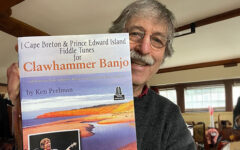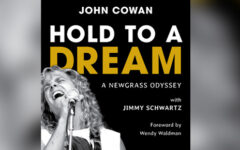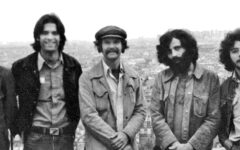 Here is another Light In The Window post from Richard F. Thompson.
Here is another Light In The Window post from Richard F. Thompson.
A variation of this piece has been published in British Bluegrass News.
Light In The Window – A series of rambles about CDs by bluegrassmercury
It has been a long time since the last Country Gazette album release, but fans of their style of bluegrass music will be delighted to know that the band has been re-activated as Alan Munde Gazette and that there is a new CD available. Made To Last (Munde’s Child Records 003) features the aforementioned Alan Munde (banjo) with Elliott Rogers (guitar and vocals), Steve Smith (mandolin and vocals), Bill Honker (bass and vocals) and Nate Lee (fiddle). Not surprisingly, Munde is very prominent not just on his two melodious, original banjo pieces Traditional Family Breakdown and The Run of ’89, but on Bill Monroe’s Brown County Breakdown (played in the key of D rather than E) and indeed throughout.
Smith and Lee add to the buoyancy with sparkling instrumental interludes on these tunes and elsewhere. Smith, Rogers and Honker share the lead vocal duties pretty evenly, with the first named having the sharpest edge to his singing. It is Bill Honker who wrote and sings lead on the title track, which is about life in a mining town long after the economic boom has passed. Above The Waterline, a Cajun flavored song about post Hurricane Katrina expectations, comes from same pen. Rogers brought four songs to the sessions, including the ballad, Haul Away, performed largely as a Rogers-Smith duet; Little Teardrops, about a troubled son who ignores parental guidance; and Wave Goodbye, a good addition to the hobo song cannon. Smith’s vocal show-case is the old standard John Hardy. There is a lot to enjoy on this self-produced collection.
Balsam Range, so called because of a mountain ridge close to where they are based, is another of the very good new bands hailing from western North Carolina. Last Train To Kitty Hawk (Mountain Home 12062) is their second album in quick succession. Individually, they are Buddy Melton (fiddle), Darren Nicholson (mandolin), Marc Pruett (banjo), Caleb Smith (guitar) and Tim Surrett (acoustic bass and xenophobic guitar). Each is a top-notch musician who combine well on both fast-paced songs and slower numbers. All but Pruett contribute vocally and each shares the lead role.
There is a good balance between secular material and sacred. In the former category is Melton’s plaintive Julie’s Train, Chris Stapleton’s beautiful Somewhere In Between, the title track, about change and progress, and Smith’s Jack Diamond, a story about the old west. Alongside these new songs are modern treatments of Ralph Stanley’s I’m Lonesome Without You and Charlie Monroe’s most apt Down In Caroline. In the latter category are Place No Wreath, Spring Will Bring Flowers, Don’t Take Me Tonight As I Am, with Jeff Collin’s piano in the mix, and Dottie Rambo’s The Holy Hills, with a high baritone part sung by Karen Peck Gooch to Surrett‚Äòs lead and Melton‚Äòs tenor vocals. There is a single instrumental to close an album that has some well conceived arrangements.
Jon Weisberger’s independently released If This Road Could Talk collection consists of a dozen songs, each of which Weisberger has written either alone or with a partner. Three of them were co-written with Mark Simos, while Alan Bartram, Jennifer Strickland, Justin Carbone, Jeremy Garrett and Tim Stafford helped with one each.
Most of the songs were penned in the past five years and they reflect the various facets of bluegrass music during that period of time. Two, My Turn To Laugh and Stepping Stone, are both traditional in character, albeit that the latter reminds one of Johnny and Jack with its rumba beat. Some, like When She’s By My Side, At The Bottom Again, Aim High and the title track, are among the majority in being contemporary bluegrass. A couple, including Nothing Against Memphis and Lonely Town, are acoustic country while The Very Next Hello has the broadest appeal.
There is nothing unusual in all that is there? Well, apart from the song writing, Weisberger does nothing more than play upright bass. Now that is unusual. In all other respects this is a set of demo recordings; a very good one it must be said. The vocal duties are shared by some well-known individuals such as Alan Bartram, Jennifer Strickland, David Peterson, Justin Carbone, Jeremy Garrett, Stephen Mougin and Tim Stafford or lesser names such as Darren McGuire, Patty Mitchell, Jan Harvey, Robert Gateley, , Chris Davis, Jenni Lynn Gardner and Megan McCormick. The musicians that Weisberger has asked to help him; Chris Jones, Tim Strong, Aaron Till, Mike Witcher, Ron Block, Jesse Brock, Andy Falco and Ned Luberecki. This is a fine album with plenty of variety and many songs worthy of recording.
Among the recent releases from Rounder Records was Bobby Osborne’s third album for the label, entitled Bluegrass & Beyond (Rounder 0603). For this 12-track album, Osborne, with his band The Rocky Top X-Press, mixes straight ahead bluegrass, some soulful Gospel and a couple of traditional country songs.
The sound of Glen Duncan’s fiery fiddling kicks off the opening track, Let’s Sing Our Song, and, along with Osborne’s mandolin playing and Dana Cupp’s driving banjo, he stands out as providing some of the brighter instrumental moments on the CD. The vocal harmonies on Let’s Sing Our Song are pleasing also. Osborne is vocally assured, sufficiently so to sing tenor as well as lead on many tracks, despite his 76 years. What Would You Give In Exchange perhaps fits into all three categories. The arrangement begins with a typical brother-duet coupling of Osborne with guest Marty Stuart before the band kicks in and Country great Connie Smith replaces her husband as one of the vocalists.
Contemporary bluegrass is represented by A Wise Man’s Mind Will Change and You Can. Definitely traditional Country is After the Fire Is Gone, which has two more guests, Rhonda Vincent and brother Darrin. Certainly in the ‚Äòbeyond’ category is Jerry Reed’s Let’s Sing Our Song, a song from the Eagles’ repertoire Girl from Yesterday and Eddie Rabbit’s Driving My Life Away. The album ends with Chris Stuart’s Civil War ballad Shenandoah Wind, and then the Gospel number Way Up On The Mountain. Rounding out the set is a Bobby Osborne instrumental Hyden.
The Rocky Top X-Press are Bobby Osborne, Jr. (guitar and bass), Derrell Mosley (bass), Cupp, Glen Duncan (fiddle, guitar and banzooki) and Matt DeSpain (Dobro ¬Æ). Marty Stuart guests on guitar on “What Would You Give In Exchange”.
Johnny Williams is a little known name, but he is nonetheless a fine singer in the traditional style and an award-winning songwriter. As perhaps suggested by the title, Last Days Of Galax (Mountain Roads Records 1004), Williams is from south-west Virginia. He penned eight of the 15 songs on this album and shares co-writer credits on a further three, with John Thompson on a Gospel song Going To A Mansion; and with Tom T and Dixie Hall on Papa Loved Ringing That Bell and What Are You Trying To Say?, a song that makes one wonder why it was never written long, long ago, so commonplace is the confusion over meaning that troubles both genders.
Williams has excellent diction and an edge to his light tenor voice that is not lost on I Can’t Help It If I’m Still In Love You, but he is perhaps better when tackling his own songs, such as Your Love Holds The Key, a conventional duet with his wife Jeanette singing lead in part, the positive love song A Change In Me, the light-hearted Country Living’s Changing Every Day and Let That Someone Be You, performed solo with just a single guitar accompaniment. Sins Of War is an original song about the Civil War the mood of which is enhanced by the clawhammer banjo, while the sentimental title song bears some resemblance to the song Streets Of Bakersfield, though the instrumental ending is a strong reminder of the essence of a week at the Galax Fiddlers Convention.
Jeanette Williams (bass and vocals), Amber Collins (vocals), Debbie Yates (clawhammer banjo), Kathleen O’Connell (fiddle), Tony Mabe (banjo), Chase Johner (mandolin), Billy Hawks (fiddle) and Kenneth Berrier (steel guitar) are the studio musicians on this fine album.
Kristin Scott Benson was proclaimed IBMA banjo player of the year for 2008; a well deserved acknowledgment of her musicianship and progression up the ladder to the top strata of bluegrass musicians. After seven years as part of Larry Stephenson’s Band, Ms. Benson is now the first female Grascal.
Second Season (Pinecastle 6514) features four tunes composed by Ms. Benson; Don’t Tread On Me and Freedom Park are both full-on stomping numbers, Trying Times is a moody borderline-jazz piece, in contrast is the slower-paced Far Enough Away. The old warhorse Bugle Call Rag, Bill Emerson’s previously unrecorded No Steering, No Brakes and a couple of traditional pieces arranged by Ms. Benson, Sandy River Belle and Greencastle Hornpipe also allow her to demonstrate her stellar lead banjo picking.
There are four vocal tracks; the O’Kanes’ Imagine That (with Mickey Harris singing lead and Sally Jones adding the harmony part); No Southern Comfort (Josh Williams – lead, Harris and Ms Benson – harmony); The Gospel Way (Larry Stephenson – lead and harmony, and Williams – harmony); and Something ‘Bout You (Larry Cordle – lead and Harris harmony). On each she demonstrates her exemplary back-up playing ability.
In addition to the vocalists mentioned Ms. Benson is helped out by her husband Wayne (mandolin), Cody Kilby and David Grier (guitar), Mickey Harris or Andy Todd (bass), and Shad Cobb or Jim van Cleve (fiddle). “Second Season” is an excellent statement by one of the very best banjo players of today.







